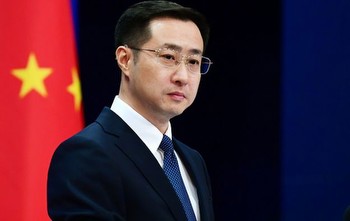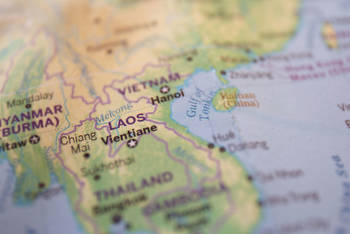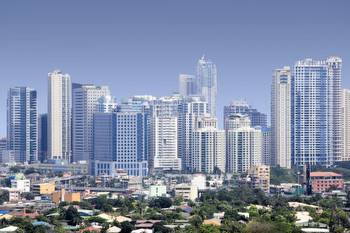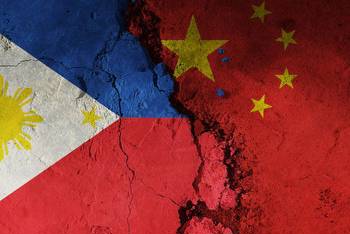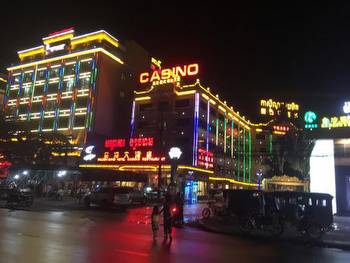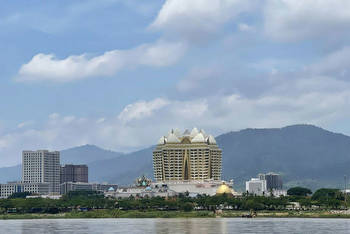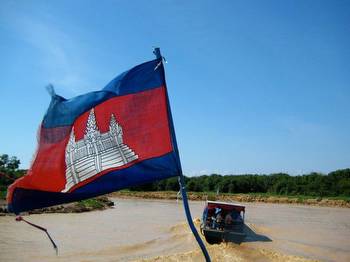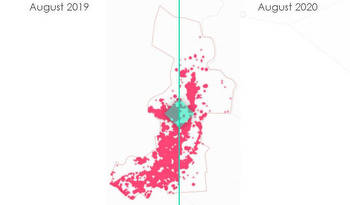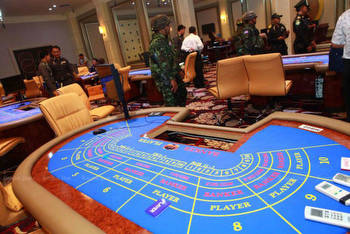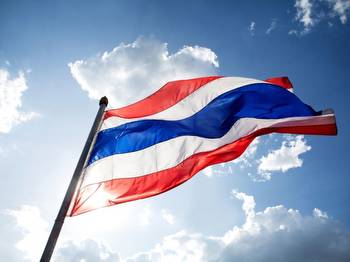Proximity to China turned Mekong River region into online gambling and money laundering hub
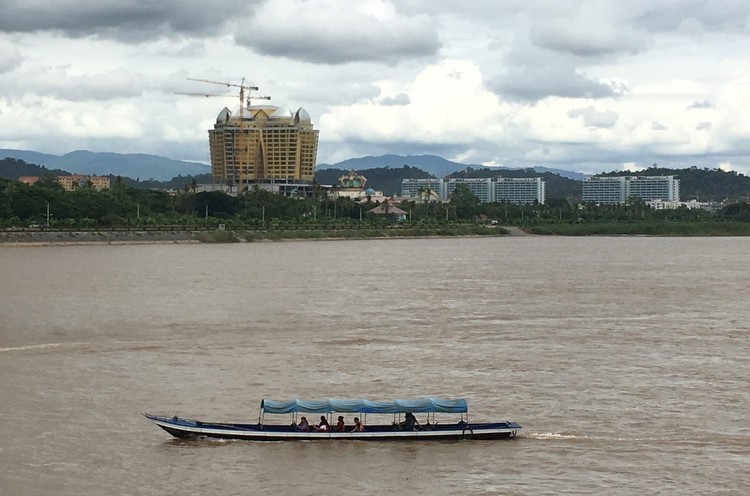
The Mekong River region has become a hub for illicit activities due to factors such as its proximity to the rapidly growing Chinese economy, emergence of casino centers catering to Chinese punters, and digital connectivity leading to online gambling and money laundering, a Myanmar-based political analyst told AGB.
In an interview with AGB, Richard Horsey, Crisis Group’s senior Myanmar adviser, discussed the scale and challenges of tackling transnational criminal networks in the Mekong sub-region.
“Like many other places in the region, its proximity to the rapidly growing Chinese economy in recent decades brought many changes, including the emergence of casino centres catering to Chinese punters – including Mong La in Myanmar’s Shan State and the Golden Triangle Special Economic Zone (SEZ) in Laos,” he stated.
The Crisis Group is a conflict mitigation organisation, which has researched how organized crime in the Mekong links to armed conflict and the political economy. The group then submits recommendations to governments and other actors, and encourages conversations between policymakers and law enforcement.
A peculiar Special Economic Zone
Two areas have emerged as illicit activities hotspots in the region, the Laos’s Bokeo province, home to the Golden Triangle Special Economic Zone, and Myanmar’s Shan State, particularly the district to the east of the Salween River bordering China, Laos and Thailand, known in British colonial times as Trans-Salween.
Located on the banks of the Mekong, just across from Thailand, the SEZ is operated on a 99-year lease held by Kings Romans Group (also known as Dok Ngiew Kham
Group), a Hong Kong-registered company founded by Chinese national Zhao Wei,
who is the SEZ’s chairman.
‘A veteran of Macau’s casino industry, Zhao Wei made his name (and likely his fortune) running casinos in Myanmar’s ethnic armed group-controlled town of Mongla
on the Chinese border from 2001, catering to Chinese getting around Beijing’s ban
on domestic gambling,’ the report describes.
The Lao government also has an equity stake in the SEZ, with construction beginning in 2007, and while the investment promotion materials promised an ambitious manufacturing, agribusiness and tourism development, the Kings Romans casino was the first venture to be built.
In a Crisis Group report on the region last year, significant money laundering takes place in the Golden Triangle SEZ, in particular at the Kings Romans Casino, and in 2018, US sanctions named Zhao Wei as the head of a Transnational Criminal Organization.
‘Crisis Group witnessed multiple separate million-dollar cash transactions at the cashier’s desk on the gaming floor of Kings Romans casino, with the bills, in bundles of 100-yuan notes, transported in plastic shopping bags or holdalls,’ the report described.
‘In addition to in-person gambling, online casino operations represent another opportunity for money laundering, although the Lao authorities have attempted to crack down on such operations at China’s behest.’
The Kings Romans Group, which runs the casino as well as a number of other projects in the zone, also leases land and commercial and residential property to other
businesses and individuals.
Residents told Crisis Group that 70,000 Chinese nationals live and work in the zone, although many had left during the COVID-19 pandemic and were returning gradually; there are also several thousand professional workers from other countries, and many thousands of semi-skilled and unskilled workers, the majority from Myanmar.
Illicit profits larger than some national economies
To AGB, Horsey underlined that this portion of the Mekong river, far from regional centres of power, has long been a location of smuggling and narcotics production and trafficking.
The 2021 coup in Myanmar was said to have unleashed centrifugal forces that have eroded Naypyitaw’s influence over trans-Salween Shan State, and on-state armed groups have subsequently tightened their grip in the area, resulting in a surge of illicit activity.
“The scale of these illicit economies is staggering – larger than some national economies. Some of these criminal investments count as among the largest infusions of foreign direct investment in the countries or subnational regions concerned. This has gone far beyond the corruption of certain state employees, and threatens to corrupt entire states,” Horsey added.
“Cracking down in one jurisdiction will just see the criminal organisation shift to the next most amenable location. Because of this, and because the criminal organisations themselves operate transnationally, a coordinated regional approach is essential.”
The tens of billions of dollars in illicit profits have driven criminal syndicates to make
huge casino and infrastructure investments, which have flowed into poorly governed
jurisdictions with weak regulatory enforcement or into semi-autonomous enclaves
beyond the state’s reach, particularly in Myanmar.
According to the NGO, the bribery and other corruption that allows these criminal activities to flourish have further corroded state institutions in the region.
The analyst, who has been based in Myanmar for 25 years, added that the latest innovation in the criminal activity in the region has been scam centres.
These centres are run mostly by ethnic Chinese criminal gangs who pay or trick young men and women from China, Malaysia, Thailand and South Asia, and as far away as Nigeria, Brazil and the Republic of Georgia, to work on sophisticated operations targeting victims around the world online with fake investments, sham romances and other such scams.
In the Crisis Group report it is described that recently Laos authorities have shuttered several scam operations, particularly those using enslaved workers.
‘This action followed pressure on SEZ management from the Lao government, and pressure on both from Beijing, as the plight of trafficked workers from numerous countries has
become a prominent diplomatic issue in the region,’ the Crisis Group report points out.
‘As a result, many of the scam centres, as well as online gambling operations, are relocating to Myanmar, in particular Tachileik in Shan State as well as Shwe Kokko and other spots close to Myawaddy in Kayin State.’
Recently, police in northern Myanmar arrested 10 phone and internet fraud suspects – accused of being ringleaders of the scam operations – and sent them to China in a highly publicised operation.
On January 23, more than 1,000 Chinese nationals were also arrested in Shan state’s Namhsan for alleged connection to scam centers, with about 44,000 people suspected of committing crimes have been handed over to China as a result of joint police action against online fraud in northern Myanmar.
Horsey also pointed out that digital connectivity and the emergence of cryptocurrencies also led to a boom in online gambling platforms targeting people in mainland China and associated money laundering.
“All these criminal enterprises have become highly sophisticated as transnational organised crime groups consolidated control and invested vast sums of money,” the analyst describes to AGB.
In order to make such large investments, these groups must “have confidence” that they will not face problems from regulators and law enforcement, and so they have gravitated to enclaves controlled by ethnic armies and militias in Myanmar, and partnerships with some governments under which then “turn a blind eye to illegal activities in return for securing large investments and a share of profits”.
The analysts also described that geopolitical competition between China and the U.S. complicates efforts towards coordinated law enforcement and regional collaboration, hindering broad multilateral action.
“China and the US both have a lot of influence in the region and – often competing – cooperation frameworks. The broader geopolitical rivalry in the Indo-Pacific often leads to competition rather than cooperation, for example with China focussed on online gambling and now scam centres, which have a big impact on Chinese citizens, but perhaps less focussed than the US would like on synthetic opioids, say,” he pointed out.
Officials from Mekong countries were said to have the need to have good relations with both Beijing and Washington, but often feel pressured to choose a side.
“This hinders the kind of broad multilateral action needed to address transnational organised crime. But there are some positive signs, including the recent meeting in Bangkok between US national security adviser Jake Sullivan and Chinese foreign minister Wang Yi, at which these issues were discussed, and the launch of the U.S.-China Counternarcotics Working Group January 30,” the analyst added.








